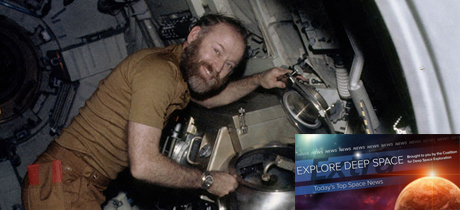In Today’s Deep Space Extra… NASA Skylab 4 commander Gerald Carr has died. Purdue University research effort could help to restrict orbital space debris. U.S. and Japan to cooperate in space defense activities.
Human Space Exploration
Astronaut Jerry Carr, who led NASA’s final Skylab crew, dies at 88
Collectspace.com (8/26): Retired NASA astronaut Gerald Carr, who commanded Skylab 4, for a then record setting 84 day, 1973/74 space mission, has died. He passed away in Albany, N.Y. at the age of 88. A U.S. Navy aviator and aeronautical engineer, Carr was selected by NASA for astronaut training in 1966. The mission to Skylab with Ed Gibson and Bill Pogue and was his only spaceflight. Inducted into the U.S. Astronaut Hall of Fame in 1997, Carr retired from NASA in 1977, after contributing to the development of the space shuttle. He went on to form a small aerospace engineering service that assisted with the designing of crew systems for the International Space Station (ISS).
Space Science
It rained so hard on ancient Mars that craters filled up and overflowed
Universe Today (8/26): A research effort by the University of Texas suggests that Mars, now cold and dry, was swamped by surface water 3 1/2 to 4 billion years ago from rainfall and snow melt. The findings are based on images of present day landforms that include crater lakes, deltas and stream channels and studies of surface materials by NASA landers and rovers.
Pluto’s glaciers change with its seasons
Spaceflightinsider.com (8/26): In July, NASA’s New Horizons mission marked the fifth anniversary of an historic flyby of distant Pluto. Though far from the sun, data from the spacecraft’s Pluto flyby suggests that glaciers on the dwarf planet change with the seasons.
AI just confirmed the existence of 50 planets by digging through NASA data
Futurism (8/25): Using an artificial intelligence (AI) algorithm, researchers were able to comb through observational data gathered by NASA’s Kepler space telescope and its successor, the Transiting Exoplanet Survey Satellite (TESS), to identify evidence for the existence of 50 planets. Kepler launched in March 2009 and completed its mission to seek out extra solar planets in October. 2018. TESS launched in April 2018 and continues to follow up on the work of Kepler.
Other News
Space mission to test Purdue-developed drag sail planned
Coalition Member in the News – Purdue University
SpacewatchGlobal.com (8/26): Developed by researchers at Purdue University, the drag sail represents a countermeasure for increasing amounts of orbital space debris. Planned for a Firefly Aerospace launch from Vandenberg Air Force Base, California in November, the 194 square foot sail will be deployed post launch to ensure the rocket’s second stage makes a timely re-entry into the Earth’s atmosphere.
ULA calls off launch of triple-core Delta 4-Heavy rocket
Coalition Member in the News – United Launch Alliance
Spaceflightnow.com (8/27): The scheduled early Thursday launch of a United Launch Alliance (ULA) Delta 4 rocket with a classified National Reconnaissance Office payload from Cape Canaveral Air Force Station (CCAFS), Florida, was scrubbed to allow troubleshooting of a ground pneumatics control system. The launch has been rescheduled for Friday at 2:08 a.m., EDT. Two launches of Falcon 9 rockets with an Argentine communications satellite and a 60 small Starlink internet connectivity satellite payload are to follow from CCAFS and NASA’s Kennedy Space Center (KSC) in the coming days. The busy schedule was characterized as “historic” earlier this week for the Florida Space Coast.
Japan and U.S. agree to boost defense cooperation in outer space
Japan Times (8/27): Japanese Prime Minister Shinzo Abe and Gen. John Raymond, chief of operations for the new U.S. Space Force, agreed Thursday to enhance bilateral space defense cooperation in response to a buildup in capabilities by China and Russia and a North Korean nuclear threat. Japan’s Space Operations Squadron is to become fully operational in 2023.
Cape Canaveral’s Air Force launch wing to become a space delta
SpaceNews.com (8/26): The U.S. Air Force 45th Space Wing stationed at Patrick Air Force Base, Florida, where it oversees dozens of space mission launches annually, will now be designated a “Delta,” rather than a “Wing”, as it becomes a unit of the recently established Space Force.

